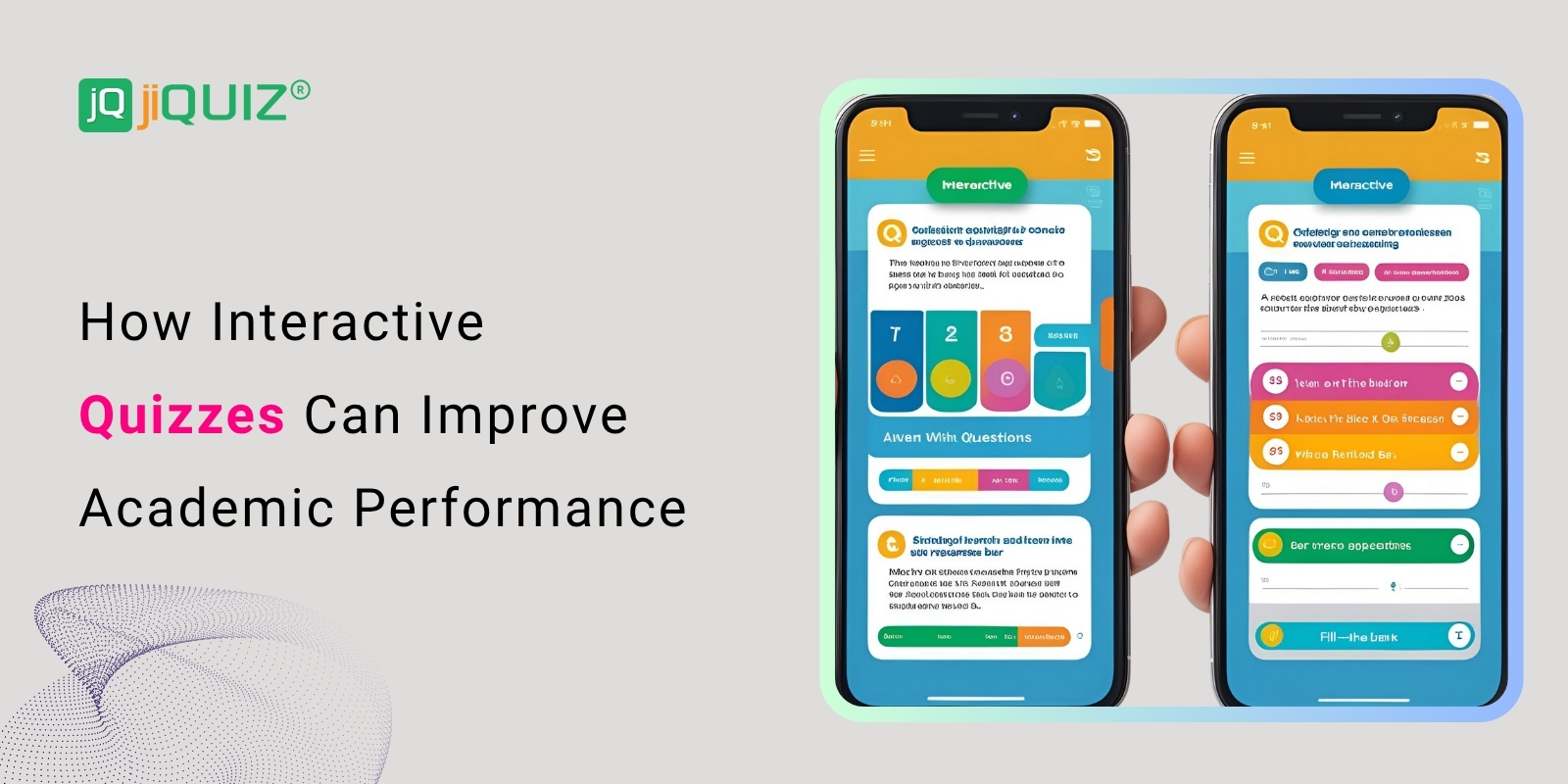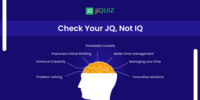- Jun 24, 2025
- Career & Skills
- 468
Share this post on:

For years, the image of a quiz has been synonymous with stress, pressure, and the looming threat of a failing grade. But what if quizzes could be more than just assessments? What if they could be powerful tools for enhancing learning and improving academic performance? The rise of interactive quizzes is changing the game, transforming them from dreaded evaluations into engaging learning experiences. This blog post explores the science behind why interactive quizzes work, the different types available, and how students and educators can effectively leverage them to achieve better results.
The Problem with Traditional Assessments
Before diving into the benefits of interactive quizzes, it's important to understand why traditional assessment methods often fall short. Many traditional exams, such as multiple-choice tests administered in a proctored environment, focus primarily on recall. While memorization is important, true understanding requires deeper engagement with the material. Here's what often hinders learning with standard assessments:
- Passive Learning: Traditional quizzes often reinforce a passive learning style. Students memorize facts to pass the test, but don't necessarily integrate the information into a broader understanding.
- Test Anxiety: The pressure of a high-stakes exam can trigger anxiety, impairing performance and hindering the ability to retrieve information.
- Limited Feedback: Often, feedback is delayed and minimal. Students may know they got an answer wrong but don't understand why.
- Lack of Engagement: Let's face it, reading a textbook or listening to a lecture can be monotonous. Traditional quizzes, while slightly more interactive, don't always spark genuine interest.
- Focus on Outcome, Not Process: The emphasis is on the final grade, not on the learning journey itself.
The Rise of Interactive Quizzes: A Paradigm Shift
Interactive quizzes address many of these shortcomings. They leverage technology to create more dynamic and engaging learning experiences. Unlike passive assessments, they actively involve the learner, prompting them to think critically and apply their knowledge.
Why Interactive Quizzes Work: The Science Behind the Engagement
Several psychological principles underpin the effectiveness of interactive quizzes:
- Active Recall: This is a cornerstone of effective learning. Active recall forces the brain to retrieve information from memory, strengthening neural pathways and making the knowledge more durable. Interactive quizzes constantly prompt active recall.
- Spaced Repetition: Effective learning often involves revisiting material at increasing intervals. Many interactive quiz platforms incorporate spaced repetition algorithms, presenting questions just when the learner is about to forget, maximizing retention.
- Immediate Feedback: Instant feedback is crucial. Knowing immediately whether an answer is correct or incorrect, and understanding why, allows learners to adjust their understanding in real-time.
- Gamification: The inclusion of game mechanics – points, badges, leaderboards – taps into intrinsic motivation and makes learning more enjoyable.
- The Testing Effect: Research consistently demonstrates that testing yourself on material actually improves learning and retention more effectively than simply re-reading the material. Interactive quizzes are a powerful application of the testing effect.
- Reduced Anxiety: When quizzes are low-stakes and focused on learning, they can alleviate test anxiety, allowing students to perform at their best.
Types of Interactive Quizzes and Their Benefits
The term "interactive quiz" encompasses a wide range of formats. Here’s a breakdown of popular types and what they offer:
- Multiple Choice with Explanations: Classic but enhanced. Providing detailed explanations for both correct and incorrect answers helps students understand the underlying concepts.
- Drag-and-Drop: These are excellent for sequencing, categorizing, and matching concepts. They encourage a deeper understanding of relationships. (Good for science, history, and literature).
- Fill-in-the-Blank: Promotes recall and precise language usage. (Effective for vocabulary, definitions, and technical terms).
- Matching: Ideal for connecting terms, concepts, or events to their descriptions.
- True/False with Justification: Forces students to evaluate statements critically and explain their reasoning.
- Short Answer/Essay (with Automated Grading): Emerging technologies are making automated grading of short answer questions increasingly viable, providing immediate feedback on written responses.
- Personality Quizzes: While often viewed as entertainment, well-designed personality quizzes can connect learning to individual preferences and styles. (Useful for career exploration, understanding learning styles).
- Scenario-Based Quizzes: Presents realistic scenarios and asks learners to make decisions, applying their knowledge to practical situations. (Especially valuable in fields like healthcare, business, and engineering.)
- Video Quizzes: Integration of video content with quiz questions makes learning more engaging and helps reinforce concepts.
How Students Can Leverage Interactive Quizzes
- Self-Assessment & Practice: Utilize online quiz platforms like Quizlet, Kahoot!, Brainscape, and others to regularly test your understanding of course material.
- Identify Knowledge Gaps: Pay attention to the questions you consistently miss. These pinpoint areas where you need to focus your study efforts.
- Active Recall Practice: Treat quizzes as opportunities for active recall, not just as tests to pass. Even if you don’t know the answer, the effort of trying to retrieve it strengthens memory.
- Review Explanations: Don’t just focus on getting the answer right. Thoroughly read and understand the explanations provided for both correct and incorrect answers.
- Create Your Own Quizzes: Many platforms allow you to create your own quizzes. This active learning process can be incredibly beneficial.
- Form Study Groups: Use quizzes as a tool for collaborative learning. Quiz each other, discuss answers, and explain concepts.
- Low-Stakes Practice: Seek out low-stakes quizzes and practice tests to build confidence and reduce anxiety.
How Educators Can Incorporate Interactive Quizzes
- Formative Assessment: Use quizzes as a tool for formative assessment – to gauge student understanding during the learning process, rather than just at the end.
- Personalized Learning: Adaptive quiz platforms can adjust the difficulty level based on individual student performance, providing a personalized learning experience.
- Engaging Lectures: Integrate short quizzes into lectures to keep students engaged and check for understanding in real-time. (PollEverywhere, Mentimeter)
- Gamified Learning: Incorporate game mechanics like points, badges, and leaderboards to motivate students and make learning more enjoyable.
- Provide Detailed Feedback: Don't just tell students whether they got the answer right or wrong. Explain why the answer is correct and address any misconceptions.
- Encourage Self-Assessment: Encourage students to use online quiz platforms for self-assessment and practice.
- Variety in Quiz Formats: Use a variety of quiz formats to cater to different learning styles and keep students engaged.
- Create a Supportive Learning Environment: Emphasize that quizzes are a tool for learning, not just a measure of performance.
The Future of Interactive Quizzes
The field of interactive quizzes is constantly evolving. We can expect to see further advancements in areas such as:
- AI-Powered Adaptive Learning: AI algorithms will become even more sophisticated, providing truly personalized learning experiences.
- Virtual Reality (VR) and Augmented Reality (AR) Integration: Immersive learning environments will combine interactive quizzes with realistic simulations.
- Automated Essay Grading: AI will continue to improve the accuracy and reliability of automated essay grading, providing more comprehensive feedback.
- Blockchain Technology: Blockchain could be used to create secure and verifiable records of student quiz performance, ensuring academic integrity.
Conclusion
Interactive quizzes are transforming the way we learn and assess knowledge. By embracing this technology, students can take control of their learning, identify knowledge gaps, and improve their academic performance. Educators can create more engaging and personalized learning experiences. As the technology continues to evolve, interactive quizzes will undoubtedly play an increasingly important role in shaping the future of education. Don't view them as a source of stress; see them as a powerful tool for unlocking your full learning potential!









